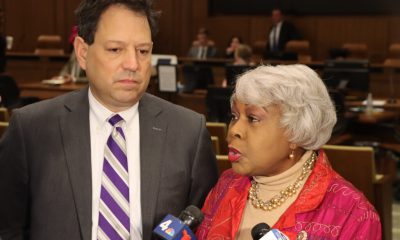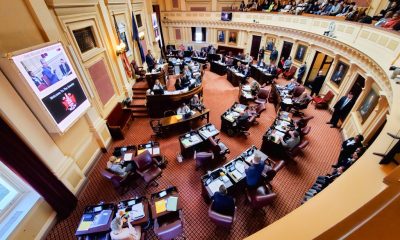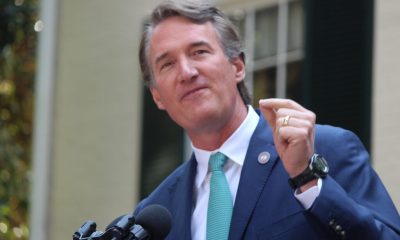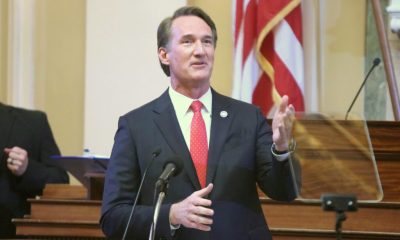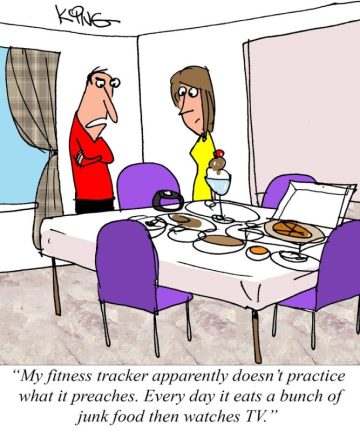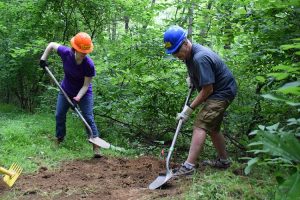State News
Virginia Announces Plan to Bring Two Pro Sports Teams to Alexandria
ALEXANDRIA — The Washington Wizards and Washington Capitals could be headed to Virginia.
State officials and Monumental Sports and Entertainment, which owns the basketball and hockey franchises, on Wednesday, unveiled plans to create a $2 billion entertainment district in Alexandria that would include a sports arena, a practice facility for the Wizards, a performing arts venue and an expanded esports facility, coupled with new retail, residential, restaurants, hotels, conference facilities, and community gathering spaces.
Located along the Potomac River in the Potomac Yards neighborhood, the proposed district would be adjacent to the Virginia Tech Innovation Campus and near Amazon HQ2, with access to air, bus and rail services.

An illustration of the proposed entertainment district in the City of Alexandria. (Courtesy of JBG SMITH)
In a release Wednesday, Virginia Gov. Glenn Youngkin called the project “the most visionary sports and entertainment development in the world, bringing together entertainment, sports, and technology in the most advanced innovation corridor in the United States: a once-in-a-generation and historic development for the commonwealth, sports fans, and all Virginians.”
The win for the Old Dominion comes at the expense of Washington D.C., which this week made a last-minute pitch to keep the teams in the city, offering $500 million in financing for an $800 million renovation of the arena the teams have been using in downtown D.C.
Under the proposed deal with Virginia, which was approved by the state’s Major Economic Incentives Commission earlier this week, the state would set up a new authority that would issue $2 billion in bonds for the district. Monumental would have a 40-year lease of the site and would repay the bonds annually through rent payments, arena parking revenues, district naming rights, and incremental taxes generated by the development. The company would also invest $403 million into the proposed project, and Alexandria would contribute $56 million toward the construction of the performing arts venue and $50 million for an underground parking facility.
The governor’s office has said the state will make no upfront investment in the project, and local residents will not be subject to any tax increases for it. The authority will own the land and buildings built under the proposal.

Virginia Gov. Glenn Youngkin at the entertainment district proposal announcement on Dec. 13 in the City of Alexandria. (Nathaniel Cline/Virginia Mercury)
At a Wednesday morning announcement at Potomac Yard, Youngkin said the project “would first and foremost be good for the Virginia taxpayer.”
“That’s exactly what this project represents,” he said. “No upfront investments, harnessing the financial horsepower of the future incremental taxes and other revenues with an estimated $12 billion of economic contribution to Virginia and the city of Alexandria over the coming decades.”
Ted Leonsis, CEO of Monumental Sports and Entertainment, called Virginia a “fantastic state,” noting, “You’re also the only state, the most successful state without professional sports teams.”
“So I think this is a big, big moment that is kind of a capstone for that journey of making Virginia a major driver and a major part of this whole new economy where sports and technology are the big drivers of what a community stands for,” he said.
The project, which is expected to open in late 2028, will require backing from the General Assembly to come to fruition. Legislators will have to approve the creation of the new Virginia Sports and Entertainment Authority that will be the issuer of the bonds, a proposal expected to come before the legislature in the upcoming session that starts in January.
While the Major Economic Incentives Commission has already backed the idea, Virginia lawmakers have balked previously at getting involved in sports team developments. During the last session, the General Assembly abandoned legislation to bring the Washington Commanders to Virginia following concerns over the use of tax revenue and team culture. The Commanders are now under new ownership.
Commanders sale could revive Virginia General Assembly interest in stadium relocation
A handful of protesters turned out Wednesday, yelling over officials’ remarks and urging policymakers to focus on other issues affecting Virginians, such as potential cuts for Metro and a lack of housing.
Patrick Hedger, a Virginia resident and executive director of the nonprofit Taxpayers Protection Alliance, said he believes stadium subsidies are a poor use of public funding and Monumental is “playing off of a bunch of really closely located jurisdictions” to finance an arena.
Hedger said he’s concerned the governor is “saddling taxpayers with this new debt and this new burden.”
U.S. Sen. Mark Warner, D-Virginia, said local, state, and federal leaders will need to build on the investment by improving existing transit and engaging with the community.
“Our job is to make sure that the neighborhoods adjacent here in Potomac Yard, across Route 1 in Del Ray and other surrounding neighborhoods, feel engaged and know that their quality of life will be protected,” Warner said. “And at the end of the day, their quality of life will be improved from this investment.”
Del. Charniele Herring, D-Alexandria, said she’s encouraged that “there is a dedication to do the work to ensure that is not disproportionately impacting our most vulnerable in our community.”
“I know, like many of you, [I] have been looking for a bipartisan agreement that will meet our community’s values and ultimately benefit the local community, Alexandria and commonwealth,” she said. “I look forward to turning this framework into an incredible project beginning as a venue for the entire community.”
by Nathaniel Cline, Virginia Mercury
Virginia Mercury is part of States Newsroom, a network of news bureaus supported by grants and a coalition of donors as a 501c(3) public charity. Virginia Mercury maintains editorial independence. Contact Editor Sarah Vogelsong for questions: info@virginiamercury.com. Follow Virginia Mercury on Facebook and Twitter.
State News
5 Things to Know About Virginia’s Newly Revealed Budget Deal
It took a little while, but Virginia’s Democratic-led General Assembly and Republican Gov. Glenn Youngkin have come up with a budget deal both sides can apparently live with.
Legislative documents outlining the agreement were released Saturday morning to allow the budget to be voted on today when lawmakers return to Richmond for a special session focused on finishing the budget. The special session is happening because Youngkin and Democratic leaders spent months publicly sparring over budget priorities and didn’t come to an agreement last month under the state’s usual timeline to pass a budget.
Virginia legislature will consider reworked state budget in May 13 special session
Without a new spending plan in place, the state was facing the possibility of a government shutdown on July 1, when the current budget expires and the next two-year spending plan begins.
The specifics of the bipartisan budget deal will be explained in more detail as lawmakers take up the bill, but here are five key takeaways.
The digital sales tax increase is out
Youngkin has repeatedly said he won’t sign a budget that raises taxes, and now he won’t have to.
A contested proposal to expand the state’s sales tax to cover digital purchases like streaming subscriptions, music downloads and software was struck from the pending budget after Democratic negotiators concluded they could achieve what they wanted to do without the extra money.
A presentation prepared for the House of Delegates Appropriations Committee notes that the digital sales tax was only on the table because Youngkin had proposed it to offset other tax cuts he wanted, but “was not driven by a systematic look at Virginia’s tax structure.’
For now, lawmakers are foregoing the roughly $1 billion in new revenue the digital sales tax was projected to generate over two years. Policymakers have indicated that the decision was made possible by stronger-than-expected tax revenues already coming in, but the idea could come back around in future years.
The new budget deal envisions a wider look at Virginia’s tax policy by a joint legislative subcommittee that will study the digital sales tax and other issues for potential action in the 2025 General Assembly session.
Democratic spending priorities are still in
Democrats have stressed that the spending in the budget deal closely resembles what they passed earlier this year, meaning they didn’t have to abandon big-ticket items by dropping the digital sales tax proposal.
The House budget presentation says the deal “retains all spending items from the conference report,” including funding increases for K-12 schools and higher education. Democrats had proposed major increases in what’s known as at-risk add-on funding, extra money the state gives to school divisions with high numbers of economically disadvantaged students.
Democrats clearly didn’t get everything they wanted out of the 2024 session, as Youngkin vetoed more than 150 bills. Several of them were high-profile Democratic priorities like legalizing retail sales of marijuana for recreational use and raising the state’s minimum wage to $15 per hour by 2026.
However, some of those vetoes freed up money in the budget tied to bills that won’t become law. Because raising the minimum wage would have come with extra costs to the state, Youngkin’s veto of that bill saved $80 million that could be used to balance the overall budget.
Teachers are still getting raises
The new budget deal includes state funding to pay for 3% raises for teachers and school support personnel in both years of the budget.
Youngkin had proposed more modest pay increases for teachers in his original budget proposal last year, but came around to supporting 3% increases in both years in the revised budget plan he offered in April.
Democrats have prioritized raising teacher pay to the national average or better, and Youngkin’s administration has stressed that educator pay has already gone up during his administration.
The budget won’t be linked to RGGI
Early in his term, the governor angered many Democratic lawmakers by issuing an executive order aiming to end Virginia’s participation in the Regional Greenhouse Gas Initiative, a multi-state program meant to reduce planet-warming carbon emissions.
Democrats questioned whether Youngkin had the authority to remove the state from a program the legislature voted to enter, and they insisted on their stance by including language in their budget proposal in March, meant to force the state to rejoin RGGI despite Youngkin’s objections.
The program requires electricity producers to purchase allowances for the carbon they emit, and some money raised from those purchases is returned to Virginia and used for flood resiliency and energy efficiency efforts. Youngkin has criticized RGGI as a backdoor tax on Virginians because it allows companies to recoup the costs through customers’ energy bills.
Litigation over Youngkin’s move is currently pending in the Floyd County Circuit Court, and the issue now appears more likely to be settled there, or through Virginia’s 2025 election.
No budget do-over for skill games
Convenience store, truck stop and restaurant owners across the state have been closely watching whether the state will repeal its ban on slot machine lookalikes known as skill games.
If that’s going to happen, it’s not happening through the budget. Instead, the budget scraps nearly $94 million in skill game revenue anticipated for fiscal year 2025, an indication the machines are unlikely to be reactivated by July 1 as the business owners wanted.
That money was expected because the General Assembly passed a bill earlier this year to tax and regulate skill games. However, Youngkin gave the bill a sweeping rewrite that upset the skill game industry by including tougher regulations and strict rules prohibiting the machines within a certain distance of casinos and gambling facilities tied to horse racing, places of worship, schools and day care centers.
The state Senate flatly rejected all of Youngkin’s suggestions last month, but at the time both the governor and lawmakers were talking about continued negotiations and finding a way forward.
With no action on skill games in the budget, Youngkin can either sign or veto the original bill he tried to overhaul. If the legislation is vetoed, skill game proponents could only continue their fight via new legislation that could be taken up later this year or in the 2025 session.
The new budget retains several provisions anticipating regulatory costs for legalized skill games, a sign there’s still a chance for the machines to be legalized later.
by Graham Moomaw, Virginia Mercury
Virginia Mercury is part of States Newsroom, a nonprofit news network supported by grants and a coalition of donors as a 501c(3) public charity. Virginia Mercury maintains editorial independence. Contact Editor Samantha Willis for questions: info@virginiamercury.com. Follow Virginia Mercury on Facebook and Twitter.
State News
U.S. Senate in FAA Bill Adds Flights at Washington National, Bucking Local Opponents
WASHINGTON — After hours of uncertainty Thursday, the U.S. Senate struck a deal to reauthorize several Federal Aviation Authority programs for the next five years, though Maryland and Virginia senators were vehemently opposed and lawmakers hoping to attach unrelated provisions lost out.
The bill heads to the House next week for final approval. Lawmakers from the lower chamber left Wednesday after approving a one-week extension for the FAA programs that expire Friday night. The Senate also passed the extension.

Terminal at Ronald Reagan Washington National Airport in Arllington, Virginia, just below, and the closest of three large international airports to, Washington, D.C. Most often called simply National Airport by locals, the airfield and terminals were named for Reagan, the 40th U.S. president, in 1998.
The late night vote, 88-4, drew resistance from the Democratic senators representing Maryland and Virginia. They held up speedier passage of the bill over objections to a provision that would allow more flights in and out of Ronald Reagan Washington National Airport, just over the Virginia border from Washington, D.C.
In a joint statement after the vote, Sens. Tim Kaine and Mark Warner of Virginia said the Senate “abdicated its responsibility to protect the safety of the 25 million people” who annually fly through Reagan airport, known as DCA.
The airport, a favorite for lawmakers as it’s closest to the Capitol, is limited by federal regulation on the number of “slots,” or flights that can take off and land per day.
“Just weeks after two aircraft nearly crashed into one another at DCA, this body refused to take up our commonsense amendment to remove a dangerous provision that would have crammed more flights onto the busiest runway in America,” the statement from Kaine and Warner continued, referring to an April 18 near-miss when two planes cleared to take off came within 400 feet of crashing.
The Virginia senators, as well as Sens. Ben Cardin and Chris Van Hollen of Maryland, held out for hours Thursday as they negotiated a vote for an amendment to strike or tighten a provision that would increase slots at DCA to five more landings and five more take-offs.
‘Over 200 member priorities’
Majority Leader Chuck Schumer, D-N.Y., agreed to bring what the senators described as a “compromise” amendment to the floor Thursday evening. The amendment proposed giving the final say on slots to the Transportation secretary after considering delays and safety.
But GOP Sen. Ted Cruz of Texas, one of the bill’s managers, objected, saying that the bill already “contains over 200 member priorities.”
Cruz, ranking member of the Senate Committee on Commerce, managed the bill with the committee’s chair, Democrat Maria Cantwell of Washington.
Cruz is a proponent of increasing slots at DCA, particularly for a direct flight from San Antonio.
Others support the increase as well: Democratic Sen. Raphael Warnock of Georgia had originally proposed adding 28 new slots per day. That idea was scrapped and replaced with Cruz’s amendment to allow five new daily flights in and out.
On the floor Thursday evening, Cruz pushed back on the safety argument, saying that “the FAA experts have recently clarified that this near miss (on April 18) had absolutely nothing to do with traffic on the runway.” He also blamed opposition on a lobbying effort from United Airlines, which operates a massive hub at Dulles International Airport in Virginia and wants to thwart competition.
Cruz said the final bill addresses safety issues by “ensuring we have sufficient air traffic controllers to monitor the traffic and protect safety.”
Late Thursday night after the bill’s passage, Cantwell took the floor to praise provisions that she said expand the aviation workforce, enhance pilot training and protect consumers.
Among its many provisions, the roughly 1,000-page legislation:
Directs the FAA to increase air traffic controller hiring targets;Raises the commercial pilot retirement age to 67 from 65;Prohibits mask-wearing and COVID-19 vaccine policies for passengers or employees;Directs the FAA to update drone testing and operating rules;Requires the Department of Transportation to create a seating policy to allow children to sit next to parents or guardians at no extra charge; andRequires airlines to automatically refund customers after three hours of delay for domestic flights and after six hours for international flights.
“These statutory rights are a big win for consumers,” Cantwell said.
Last flight out of the airport
Many lawmakers view the FAA reauthorization bill as the last major vehicle to which they can attach their priorities before November elections and the close of the 118th Congress.
That opportunity disappeared Thursday when the legislation’s managers decided against allowing non-germane amendments to ride on the bill.
Among the proposals lawmakers were eyeing as additions was Oregon Democrat Ron Wyden’s bipartisan tax bill that would expand the child tax credit and revive corporate tax breaks. Another included Sen. Josh Hawley’s Radiation Exposure Compensation Act, or RECA, which would reauthorize a fund for victims of U.S. radiation testing exposure. The fund expires June 7.
Hawley said Thursday afternoon that he wouldn’t object to the FAA bill, even if RECA wasn’t added on.
“I have no desire to tank the FAA reauthorization,” Hawley, a Missouri Republican, told reporters outside the Senate chamber. “I think we should have a reasonable process around it. But, if we’re not going to, we’re not going to.”
“At least we got automatic refunds for consumers out of this deal, which was good,” Hawley added, referring to his amendment with Democratic Sen. Elizabeth Warren of Massachusetts that senators agreed to Tuesday.
Jacob Fischler contributed to this report.
by Ashley Murray, Virginia Mercury
Virginia Mercury is part of States Newsroom, a nonprofit news network supported by grants and a coalition of donors as a 501c(3) public charity. Virginia Mercury maintains editorial independence. Contact Editor Samantha Willis for questions: info@virginiamercury.com. Follow Virginia Mercury on Facebook and Twitter.
State News
Port of Virginia on Track to Have Deepest Channels on East Coast
Even while unexpectedly supporting the Port of Baltimore over the past three months, the Port of Virginia is on its way to having the deepest channels on the East Coast by next year, a distinction that will help it further support the exchange of domestic and international goods.

The Port of Virginia is on its way to having the deepest channels on the East Coast by 2026. (Courtesy Port of Virginia)
According to Port of Virginia CEO and Executive Director Stephen Edwards, such investments have helped the company maintain a competitive edge in the market.
Decades of foresight enable Va. to process cargo diverted from Maryland after bridge collapse
Last year, the port processed 3.25 million twenty-foot equivalent units (TEUs) — a unit of measure used in the industry to determine cargo capacity — which is slightly less than the 3.7 million it handled in 2022.
Baltimore aid
On Thursday, Edwards provided an overview of the port’s operations at an annual luncheon with business leaders and officials from around the commonwealth. He also detailed how the port handled additional cargo shipments that were diverted from the port in Baltimore after a ship crashed into a bridge above the port’s channel in March.
Officials from the Port of Virginia have handled about 15,000 additional container units and multiple ro-ro shipments, such as vehicles and machinery, to keep supply chains moving. The temporary measure is expected to end this month due to developments of reopening the Port of Baltimore.
“It’s a testament to our team, our operations, and the strategic investments in projects that we are able to meet these moments while still performing at the highest level,” said Edwards, who also commended other ports on the East Coast for rising to the occasion.
“When something works and works well, it is, after all, human nature not to pay too much notice, but the Key Bridge collapse put a spotlight on the vitality of our work and our industry,” Edwards said. “I know we’ve all felt a greater focus on the implications of what we do each and every day.”
Going deeper
Edwards said the port’s implementation of the $1.4 billion Gateway Investment Program is helping transform its operations, highlighted by a dredging project to deepen the channel at Norfolk Harbor. The investment program includes plans to upgrade the Norfolk International Terminal — a semiautomated terminal that allows the transfer of containers — expand the central rail yard, and implement an offshore wind energy hub.
The port has also transitioned to powering all its terminals with electricity from clean resources and expanding its channel to allow for larger cargo ships.

House Speaker Don Scott, D-Portsmouth, presenting Port of Virginia CEO and Executive Director Stephen Edwards with a resolution passed by the General Assembly at the State of the Port luncheon in Virginia Beach on May 9, 2024. (Nathaniel Cline/Virginia Mercury)
Port officials said Norfolk Harbor is the only channel on the East Coast with Congressional authorization to dredge down to 55 feet.
Once the dredging and widening are complete, port officials said the harbor will offer the “deepest, widest channels on the U.S. East Coast and commercial channels will allow safe, two-way traffic” for larger ships.
House Speaker Don Scott, D-Portsmouth, who presented Edwards with a resolution on Thursday commending the port’s work, said the commonwealth is committed to investing in the cargo terminals in Hampton Roads and Richmond.
“We’ve invested hundreds of millions of dollars to make sure that our port is the very best port with the deepest water, but we also have to continue to sustain that investment,” Scott said, adding that these investments create jobs and make the commonwealth more competitive.
As part of the integrated freight strategy between the port and Virginia, work is underway to expand the Hampton Roads Bridge-Tunnel, and widen Route 58 in Patrick County and Interstate 64 in New Kent.
by Nathaniel Cline, Virginia Mercury
Virginia Mercury is part of States Newsroom, a nonprofit news network supported by grants and a coalition of donors as a 501c(3) public charity. Virginia Mercury maintains editorial independence. Contact Editor Samantha Willis for questions: info@virginiamercury.com. Follow Virginia Mercury on Facebook and Twitter.
State News
Virginia Health Officials Launch ‘Surveillance System’ for Kids Sickened by Cannabis
Virginia officials are instructing healthcare providers to start keeping track of “adverse events” involving children and teens being exposed to cannabis products.
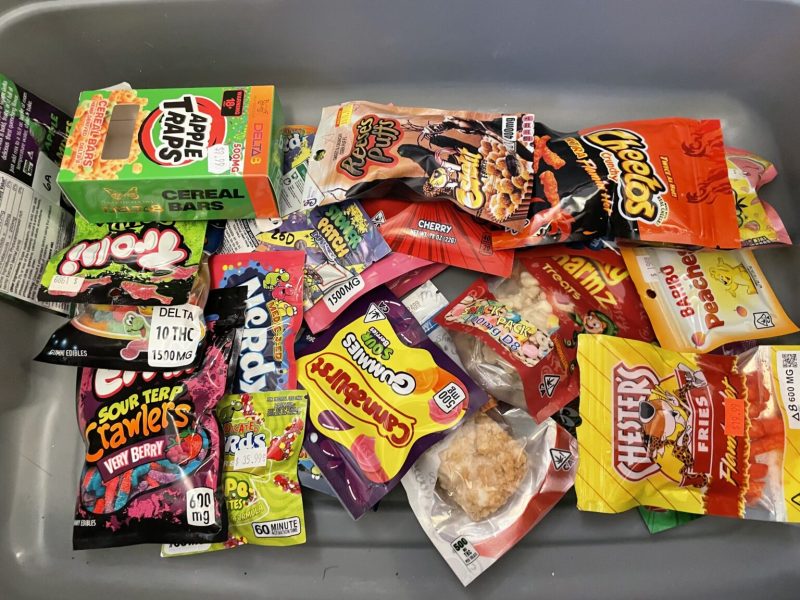
Attorney General Jason Miyares displayed a bin of THC edible products from Virginia stores. Experts say the products have caused a spike in poison control calls involving young children and teens. (Photo by Graham Moomaw)
In an April 24 letter to clinicians, State Health Commissioner Karen Shelton said her agency had received enough reports of minors getting sick from products containing CBD and THC, chemical compounds found in cannabis, that the state was establishing a “special surveillance system” to keep tabs on the issue.
“Reported symptoms for these adverse events have included vomiting, hallucinations, low blood pressure, low blood sugar, altered mental status, and anxiety,” Shelton wrote, adding that “some hospitalizations have occurred” as a result of minors consuming cannabis products.
The letter specifically asks that local health departments be made aware of any cannabis-related hospitalizations in patients under 18 years old and any “clusters of adverse events” affecting multiple minors.
“After a hospitalization or cluster is reported, VDH staff will collect information about the illness(es), possible exposures, and laboratory results,” the letter says.
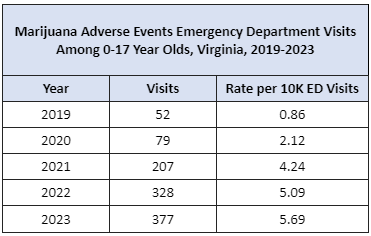
State data shows an increase in emergency room visits involving minors and cannabis. (Source: Virginia Department of Health)
The Health Department provided data showing an increase in emergency room visits involving minors being exposed to cannabis and said the new surveillance system will help bolster those tracking efforts. In 2019, there were 52 ER visits. By 2023, the number had grown to 377.
That data only covers emergency room visits and doesn’t reflect every incident reported to health officials.
“As a result of these data, the special surveillance system was established in order for VDH to receive these reports directly and better assess the impact of adverse events related to consumption of products containing THC or CBD among children in the Commonwealth,” said Health Department spokesperson Cheryle Rodriguez.
The letter also points to an online portal allowing anyone who had an adverse experience with cannabis products to submit a report to the Health Department with information about what happened, where the product was obtained, and how it was labeled. The agency also noted that lab testing is available to “support patient and product testing.”
The tracking system set up by health officials is the latest government effort to mitigate the downsides of cannabis, as policymakers continue to debate what to do about adult use of marijuana and products close enough to weed to produce a similar high. Earlier this year, Gov. Glenn Youngkin pointed to health risks to children as one of his reasons for vetoing legislation that would have legalized retail sales of marijuana for purely recreational use.
“The most concerning consequence of cannabis commercialization is its impact on adolescents and our children,” Youngkin said in his veto statement, which also cited data showing increases in calls to poison control centers for children who consumed cannabis edibles.
There have been numerous news stories in the past few years of THC-related overdoses at Virginia schools, some of them being serious enough to require hospitalization. Last year, a high school in the city of Richmond took the unusual step of banning all candy after four students suffered “medical distress” after eating edibles believed to contain a form of THC, the intoxicating element found in marijuana, according to the Richmond Times-Dispatch.
As lawmakers have relaxed Virginia’s laws on adult possession of small amounts of marijuana, they’ve taken steps to crack down on legally murky products like delta-8 THC, which produces a high similar to marijuana but has gone largely unregulated because it’s typically derived from hemp plants.
Michelle Peace, a forensic science professor at Virginia Commonwealth University who specializes in vaping and cannabis research, said data collection and better testing will help health officials “get their arms around” the issue.
“It’s important to know how pervasive the problem is,” Peace said in an interview.
Peace has been doing her own research into the vaping habits of Virginia K-12 students by testing the contents of vape equipment confiscated by school officials. Out of 369 submissions, 82% contained nicotine, and 18% had some form of THC.
Much of that THC was “very highly concentrated,” Peace said, making it more likely that the user would experience negative effects.
“At the end of the day, there needs to be proper attribution as to what the child actually consumed,” Peace said.
Editor’s note: This story was updated after publication with additional information from the Virginia Department of Health.
by Graham Moomaw, Virginia Mercury
Virginia Mercury is part of States Newsroom, a nonprofit news network supported by grants and a coalition of donors as a 501c(3) public charity. Virginia Mercury maintains editorial independence. Contact Editor Samantha Willis for questions: info@virginiamercury.com. Follow Virginia Mercury on Facebook and Twitter.
State News
Virginia Attorney General Joins Efforts to Fight Back Against Title IX Changes
Virginia Attorney General Jason Miyares has joined a multi-state effort to stop new Title IX rules from going into effect.
The list of new rules designed to protect victims of campus sexual assaults and the rights of LGBTQ+ students has come under attack by Republican attorneys general in several states.
Miyares called the changes a “dangerous overhaul” of Title IX and said the new rules would negatively impact students, families, and schools in the Commonwealth. The ruling also comes after Gov. Glenn Youngkin’s administration overhauled the commonwealth’s transgender student policies.
“The Biden Administration’s unlawful rule would jeopardize half a century of landmark protections for women, forcing the administration’s social agenda onto the states by holding federal funding hostage,” Miyares said in a statement. “They are avoiding Congress and the constitutional process because they know it will not pass. We cannot roll back Title IX in the name of false equity.”

Virginia Attorney General Jason Miyares at the Virginia State Capitol on Jan. 10. (Nathaniel Cline/Virginia Mercury)
Attorney generals from Tennessee, Indiana, Kentucky, Ohio, and West Virginia have also signed onto the suit, which was filed in Tennessee. Separate lawsuits have been filed in other states, including Louisiana and Texas.
Title IX, which has undergone several transformations based on the political party in office, was created to address women’s rights and prohibits any federally funded school or education program from discriminating against any student based on sex since it was established in 1972.
The Department of Education said some differences compared to the previous version developed under the Trump administration, include protections against all sex-based harassment and discrimination, prohibits schools from sharing personal information and supports students and families.
Narissa Rahaman, executive director for Equality Virginia, said in a statement that the rule prevents opponents from weakening “crucial” civil rights protections, including for LGBTQ+ students, by ensuring that pregnant and parenting students have a right to equal education opportunities, protecting student survivors and guaranteeing the rights of LGBTQ+ students to come to school as themselves without fear of harassment or discrimination.
“Students across races, places, and genders prove every day that they can do great things, especially when there are strong Title IX protections in place, which is why the Biden Administration’s updates to the Title IX rules are essential to ensure every student can thrive at school,” said Rahaman.
The new rule is slated to take effect on Aug. 1 and will apply to complaints of alleged conduct that occurs on or after that date, according to the Department of Education.
Protections
While the ruling protects students and employees from all sex-based harassment and discrimination, it will also impact LGBTQ+ students and employees, including providing complete protection from sex-based harassment and prohibiting schools from sharing personal information.
Schools must act “promptly and effectively” to protect and treat all students and staff who make complaints “equitably.” Schools must also provide support measures to complainants and respondents, and act to end any sex discrimination in their programs and prevent any recurrence.
The rule further clarifies the definition of “sex-based harassment,” which means to treat someone unfairly because of their gender; and the scope of sex discrimination, including schools’ obligations not to discriminate based on sex stereotypes, sex characteristics, pregnancy or related conditions, sexual orientation, and gender identity.
The federal agency said the changes will empower and support students and families by requiring schools to disclose their nondiscrimination policies and procedures to all students, employees, and other participants in their education programs so that students and families understand their rights.
The final rule also protects against retaliation for students, employees, and others who exercise their Title IX rights, and supports the rights of parents and guardians to act on behalf of their elementary school and secondary school children.
The rule also protects student privacy by prohibiting schools from disclosing personally identifiable information with limited exceptions, which is something the Youngkin administration has opposed.
Advocates say one of the rights students should have is the power to decide who finds out about their transgender status, to protect them from being bullied or harassed.
Virginia policies
In 2021, the first model policies for transgender students were designed under former Gov. Ralph Northam to provide school officials guidance on the treatment of transgender and nonbinary students and to protect the privacy and rights of these students.
However, some schools declined to adopt the model policies, and the state law that led to them lacked enforcement incentives or penalties.
The current policies adopted by the Youngkin administration were revised to require parental approval for any changes to students’ “names, nicknames, and/or pronouns,” direct schools to keep parents “informed about their children’s well-being” and require that student participation in activities and athletics and use of bathrooms be based on sex, “except to the extent that federal law otherwise requires.”
Virginia schools have also not fully adopted the newly revised policies, and state law has not changed since the policies were overhauled in 2023.
The Virginia Department of Education faces two lawsuits over the policies adopted by the Youngkin administration.
“All Virginia students, including our transgender and non-binary students deserve to feel safe and welcomed at schools,” said Wyatt Rolla, a senior transgender rights attorney with the ACLU of Virginia. “Accessing restrooms, locker rooms and other facilities that are necessary when you are at school learning is a key part of our schools being inclusive of those transgender [and] non binary students that are part of our community.”
Athletics not included
The provisions under the new Title IX rule did not mention anything about requiring schools to allow transgender students to play on teams that align with their gender identity. Virginia has taken its own shot at banning transgender athletes from competing in sports through legislation.
In February, the Youngkin administration attempted to challenge the Virginia High School League’s policy on transgender athletes, the Daily Progress reported.
The proposed policy would have matched with the administration’s current policies that students should be placed on teams based on their biological sex rather than their gender identity.
The Virginia High School League, which oversees interscholastic athletic competition for Virginia’s public high schools, allows for transgender athletes to participate on teams that match their gender identity, but under certain conditions.
Simultaneously, lawmakers in the Virginia General Assembly controlled by Democrats killed bills, including Senate Bill 68, during the previous session that would have essentially banned transgender students from competing in sports.
Sen. Tammy Brankley Mulchi, R-Mecklenburg, who carried Senate Bill 723, said students like her 6-year-old granddaughter should have a choice to play with their own gender during a Feb. 1 Senate Education subcommittee hearing.
Mulchi’s bill would have required schools and colleges to have separate sports for boys and girls based on their biological sex. Any dispute would require a note from a doctor.
“If she [my granddaughter] wants to play an all-girl sport, I want her to play against girls that were born girls and not play against someone that is much stronger than her or can hurt her and take away her chances of a scholarship,” Mulchi said.
However, Sen. Stella Pekarsky, D-Fairfax, argued during the February hearing that whether students are competing with their respective biological sex or not “children of all ages, sexes have different builds and strengths and no children are alike on the same team.”
by Nathaniel Cline, Virginia Mercury
Virginia Mercury is part of States Newsroom, a nonprofit news network supported by grants and a coalition of donors as a 501c(3) public charity. Virginia Mercury maintains editorial independence. Contact Editor Samantha Willis for questions: info@virginiamercury.com. Follow Virginia Mercury on Facebook and Twitter.
State News
Bill Banning Certain Driveway, Pavement Sealants to Take Effect This July
After attempting to ban the products in previous sessions, the Democratic legislature passed a bill Republican Gov. Glenn Younkgin signed that bans the sale of pavement sealant containing a set of chemicals environmental groups say seep into the environment, causing health issues for wildlife and humans. The ban begins July 1.
House Bill 985 prohibits the sale of the sealant used for driveways and parking lots that use certain concentrations of Polycyclic Aromatic Hydrocarbons, or PAHs, chemicals commonly found in coal tar.
“PAHs are definitely toxic. There isn’t a question about that,” said Joe Wood, senior scientist with the Chesapeake Bay Foundation, a major backer of the bill. “When organisms — whether oysters, mice, or fish — are exposed to these products in research studies, they have caused negative health effects.”
But groups that use the pavement sealers, primarily the Pavement Coating Technology Council, pushed back against the bill during the session, saying they shouldn’t be stopped from using the PAH-heavy sealants because other sources of the chemicals release them into the environment.
“We’re concerned that small businesses across Virginia will get snarled by these violations and penalties and not have anywhere to turn to remedy that situation,” said Alex Thorup, a lobbyist on behalf of the PCTC.
Other sealers felt differently. Michael Jones, owner of Jones Striping and Sealcoating LLC, said the PAH ban shouldn’t be a problem, given the health benefits his employees experienced after switching to an alternative material and that his company has still found work.
“We learned, of course, first hand, that [the coal tar] is toxic, and it does burn the skin also,” Jones said in a Feb. 27 committee testimony. “We [switched] because of the health of our clients’ employees and, of course, protecting the environment.”
The chemicals and how often they are used
The PAH chemicals naturally occur in coal, crude oil, and gasoline. The PAHs in pavement sealants come from coal tar, a byproduct of coking, or heating up coal to make it a higher quality.
The pavement sealant uses coal tar to fill cracks and provide a smooth finish on top of asphalt. From there, the pavement’s dust is kicked up into the air by the wind, washed away by stormwater runoff, or knocked loose from abrasive tires on roadways.
A study from the U.S. Geological Survey found that house dust in areas around where coal tar seal coating was used had a PAH concentration of 129 milligrams per kilogram. The seal coat itself had a PAH concentration of 66,000 milligrams per kilogram. Coal tar comprises about 20 to 35% of the product.
Conversely, non-coal tar sealants — such as asphalt emulsion, usually made up of asphalt water and soap — produced lower PAH concentrations in house dust, as little as 5 milligrams per kilogram. The asphalt emulsion product itself typically has concentrations of 50 milligrams per kilogram.
“Asphalt and asphalt-based seal coat products have much lower concentrations of PAHs,” USGS stated.
The environmental health harm
Several different research papers point to the chemicals causing harm to ecosystems, though some of the research is disputed.
The USGS research found that people living near coal tar sealants were 38 times more likely to have an “extra risk” of developing cancer than those living near unsealed pavement. In the Elizabeth River, the PAH chemicals from a nearby wood treatment plant were found to be a “plausible link” to cancer in killifish.
The presence of PAH from leaking petroleum storage tanks in Lewis Creek led the Department of Environmental Quality to create a total daily maximum load limit, or TMDL, in 2006 to reduce the amount of pollution runoff.
“With successful completion of implementation plans, Virginia will be well on the way to restoring impaired waters and enhancing the value of this important resource,” the TMDL plan stated.
However, the Pavement Coating Technology Council has pointed to errors in the USGS research, stating invalid modeling was used. The group also called out PAH pollution research done in Austin, Texas, which has waterways with more of a rock-based bottom that soil washes away from instead of East Coast waterways with dirt bottoms that collect soil over time.
The Austin research sampled soils in the waterway in 2005, 2008, and 2023 and didn’t find an accumulation of PAH chemicals, said Robert DeMott, a toxicologist with environmental engineering firm Ramboll, in a Feb. 27 committee testimony.
“We found that the ban did not yield a noticeable reduction in PAH levels across all of those creek systems,” said DeMott. “A narrowly targeted approach of focusing on only one source is unlikely to change the environment at large substantially.”
DEQ Director Michael Rolband added testimony on the bill saying the PAH chemicals are toxic, but linking their presence in the environment with pavement sealants was questionable.
A 2018 DEQ report summarizing research on the topic stated: “Land-use analyses have found that PAH concentrations do not correlate well with impervious surfaces if roadways are included. However, if roadways are separated out, PAH concentration correlates weakly with roadways and much more strongly with other types of impervious surface (i.e., parking lots).”
What the bill does
The bill creates a new section under the Environmental Emergency Response Fund statute, which is used for cleaning up environmental hazards.
Del. Kathy Tran, D-Fairfax County’s legislation sets a ban on selling pavement sealers with a PAH concentration of more than 1% of the product weight after July 1.
There’s also a provision that lets businesses in Virginia with the product in stock sell their inventory, but no one will be able to use it after July 1 of next year. Violations of the bans would result in a $250 penalty; those funds would then be deposited into the Environmental Emergency Response Fund.
The changes shouldn’t be a problem, Tran testified in committee testimony, considering that most large retailers selling gallon buckets of the sealant for homeowners to use on driveways are no longer doing so.
Jones, whose business deals with practical aspects of the product, including applying it to the ground, added compliance shouldn’t pose a challenge, considering his business transitioned away from the coal tar product years ago.
The change may have resulted in a 5 to 10% cost increase for him. However, his company’s portfolio of smaller projects is still active, evidenced by a 450-square-foot parking lot he recently did in downtown Richmond, which used 350 gallons of low-PAH sealant for the job.
“The quality is the same if not better,” Jones said, adding that his work is “a drop in the bucket” compared to the size and number of projects in the rest of the state.
National sealant distributors, like SealMaster, which has several locations in Virginia, have endorsed the pivot away from coal tar sealants with higher PAH concentrations in favor of “environmentally friendly” sealers.
For Jones, the health and safety of his workers outweigh any cost increases from the alternative sealants he uses now.
“They were coming [to work], but they weren’t as happy,” Jones said of his employees who may have been injured by coal tar sealant and previously had to wear long sleeves and facemasks in the outdoor heat as a precaution.
This story was updated to correct that the year DEQ’s report came out was 2018 and the concentrations of PAH in a coal tar sealant product.
by Charlie Paullin, Virginia Mercury
Virginia Mercury is part of States Newsroom, a nonprofit news network supported by grants and a coalition of donors as a 501c(3) public charity. Virginia Mercury maintains editorial independence. Contact Editor Samantha Willis for questions: info@virginiamercury.com. Follow Virginia Mercury on Facebook and Twitter.








